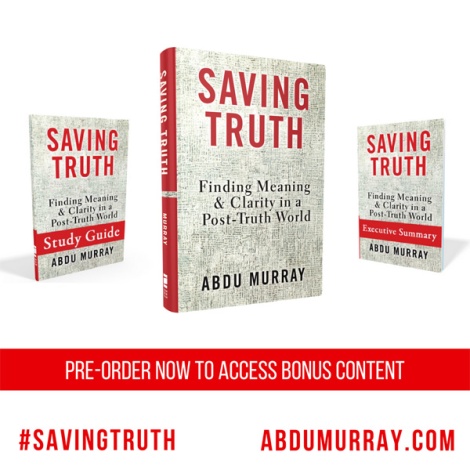
I have the privilege of being part of the blog tour for the apologetics book Saving Truth by Abdu Murray which has been available for purchase now for one whole week. I’ve already written a number of posts based on what I was learning from the book. It’s a deep well. Hence, I’m happy to tell others about the book, to recommend it unequivocally.
Abdu Murray establishes his premise—that western culture has passed into a post-true era that essentially dismisses the question, “What is truth” in favor of the question, “What’s your opinion, based on your perceptions and feelings?”
In the opening chapters Murray does a masterful job explaining how this post-truth mindset brings on chaos and confusion. As a result, any number of “truth claims” clash. There’s no rational, logical, consistent way of looking at the world, at society. At one university campus, for example, an atheist received such a negative reaction, he was dis-invited to a particular event because he took a stand against Muslims. But at the same campus, violent protests prevented a conservative speaker from taking the podium.
I especially appreciated this perspective because I have repeatedly decried the inconsistencies that have taken hold of society. So on one hand the powers that be claim science and only science can be taught in school when addressing the origin of the universe. But on the other hand, those same powers say a person can determine his, her, its, gender identity, not based on the observable science at all but on what the individual feels like inside.
Abdu Murray sensitively addresses the issue of gender confusion in one of the chapters in Saving Truth entitled “Clarity about Sexuality, Gender, and Identity.” Interestingly, Murray expresses deep understanding for those in the throes of confusion, in part because of the identity upheaval he himself experienced as a Muslim who converted to Christianity.
Many of his remarks brought to mind Rosaria Butterfield who was an English professor steeped in feminism and the LGBT community, until she found Christ. As Murray expressed, Butterfield found the radical change from leaving one group and embracing a vastly different one, to be somewhat unsettling. I can well see why Abdu Murray’s remarks on this subject are full of compassion, while providing the clarity promised in the chapter title.
Clarity is precisely what this muddled post-truth society needs, and Murray includes other particular topics: science and faith, religious pluralism, human dignity, and freedom.
I found Murray’s remarks on the subject of freedom to be particularly enlightening. He explained that what the society based on personal perceptions and feelings is looking for is autonomy, not actual freedom. (See this post for a more complete discussion on the subject.) Autonomy, or self-rule, wants to throw off external authority in order to “have things my way.”
As I read the opening chapters of Saving Truth , I not only found clarity, but I began to wonder just what solution Murray could offer readers as we do our part to “save truth,” to reverse the trend, to restore the absolute in place of the chaos and confusion.
I’ll be honest, I should not have been looking for some human magic bullet that would sway our society away from the way of the world. I know better, but when I came to the end of the book, I felt humbled before the infinite Creator actually does know the end from the beginning and has not been caught off guard by the trends of our time.
It was a powerful ending. Clarifying, just as the chapter titles promised.
Who should read this book? I wish people who are think all religions are basically the same would read it. I wish those confused about sexual identity—their own or someone else’s—would read it. I wish those uncertain about the origins of the universe or the place humans play in the scheme of things or ones struggling against authority would read this book.
I don’t know if any of those people who desperately need the book will pick it up. Are they looking to find the answer to Saving Truth?
Perhaps just as important, and perhaps more realistic would be for Christians who want to understand these issues better, who want to know what to say to the people in their world who struggle with these ideas, to read the book, even to study it with like-minded people. I’d go so far as to say, Christians who are engaged in our culture, who take our faith seriously, well benefit in innumerable ways from reading Saving Truth.


 As I read from the Old Testament prophets, one topic is repeated over and over, no matter which people group is the subject of the prophetic message or what era the prophets wrote. Over and over, from Isaiah to Jeremiah to Hosea to Amos and all the others, the topic of idol worship comes up.
As I read from the Old Testament prophets, one topic is repeated over and over, no matter which people group is the subject of the prophetic message or what era the prophets wrote. Over and over, from Isaiah to Jeremiah to Hosea to Amos and all the others, the topic of idol worship comes up.

![PowerElementsCharacterDevelopment[1000][1]](https://rebeccaluellamiller.files.wordpress.com/2015/05/powerelementscharacterdevelopment10001.jpg?w=205)







